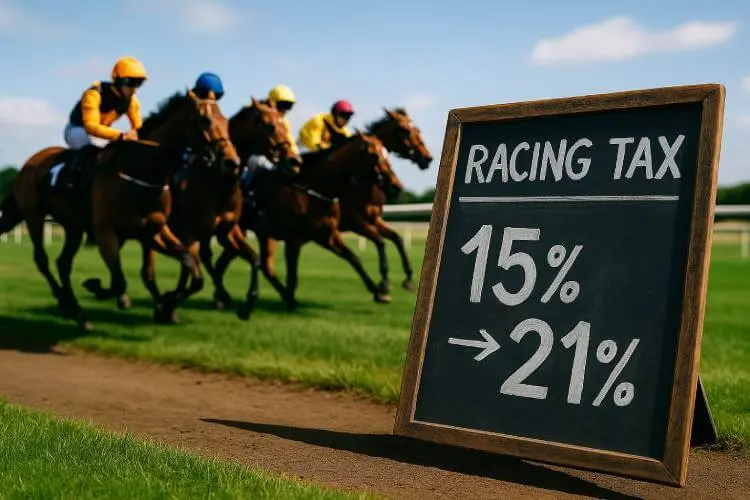British Racing to Stage Historic Strike Over Betting Tax Plans


British racing will grind to a halt on 10 September 2025 as the British Horseracing Authority (BHA) confirmed it will cancel all fixtures that day in protest against the UK government’s proposed gambling tax reforms. Four meetings at Lingfield Park, Carlisle, Uttoxeter, and Kempton Park have been rescheduled, marking the first time in modern history the sport has voluntarily refused to race in response to government policy.
The strike, timed just before the high-profile St Leger Festival at Doncaster, is part of the BHA’s “Axe the Racing Tax” campaign, which warns the government’s proposed Remote Betting and Gaming Duty could devastate the industry.
Why the Tax Strike Matters for Bettors and Operators
For both sports bettors and sportsbooks & casino operators, the strike isn’t just about horses. The UK Treasury has launched a consultation to merge three current duties: Remote Gaming Duty (21%), General Betting Duty (15%), and Pool Betting Duty (15%), into a single harmonised rate.
If adopted, this would mean horse racing betting, currently taxed at 15%, could be pushed up to at least 21%, the same level as online casinos and slots. Some industry analysts warn the final rate might even rise higher, depending on the outcome of the Autumn Budget.
The Financial Stakes for Racing and Betting
The BHA estimates that a harmonised tax rate could cost the industry £330 million over five years. British racing currently contributes £4.1 billion annually to the economy and supports around 85,000 jobs, many in rural areas.
Bookmakers already funnel around £350 million a year into racing via the statutory 10% levy, sponsorship deals, and media rights. But operators like Flutter (Paddy Power, Sky Bet) and Entain (Ladbrokes, Coral) warn that higher duties could squeeze their margins, forcing cuts to sponsorships and investment. They also caution that punters may drift toward unregulated black market sites, which contribute nothing to racing or the Treasury.
A First in Racing History
British racing has paused before due to severe weather, equine flu, and the Covid-19 pandemic, but never as an act of protest. Brant Dunshea, CEO of the BHA, described the strike as “unprecedented,” highlighting the “catastrophic” consequences the tax plan could have.
By choosing 10 September, the day before the St Leger Festival, one of the calendar’s showpiece events, the BHA has maximised visibility for its campaign. The move has also been backed by the Jockey Club, Arena Racing Company, and the National Trainers Federation, signalling broad industry support.
Public Sentiment: A Divided Audience
Reactions to the strike have been deeply split. Leading trainers such as Nicky Henderson and the National Trainers Federation argue that cancelling fixtures is a necessary sacrifice to draw attention to the threat. Many punters online have voiced similar concerns, warning that government taxation risks pricing ordinary bettors out of the sport while weakening one of Britain’s cultural mainstays.
In contrast, the Betting and Gaming Council (BGC) has condemned the move as a “futile political gesture.” The trade body stressed that bookmakers were not consulted, and some fans echoed that frustration, saying the disruption penalises racegoers rather than policymakers.
Industry Comparisons and Political Context
Similar tax hikes abroad have strained operator–racing relationships. Ireland doubled its betting duty in 2019, while France has repeatedly adjusted levies, often prompting industry backlash. What makes the UK unique is the attempt to merge duties into a single rate, a simplification on paper that risks treating racing bets like online slots.
The strike comes just weeks before Chancellor Rachel Reeves delivers the Autumn Budget, where tax rises are widely expected. With a £51 billion shortfall in public finances, Labour will be under pressure to find revenue streams. Online gambling, which generated £1.49 billion in Q1 2025/26, is an obvious target.
Fallout for Operators and Players
For operators, higher duties mean shrinking margins across sports betting, poker, and online bingo. Marketing budgets and player promotions will likely be the first casualties. Many may also redirect sponsorship money away from racing and toward more profitable verticals like online casinos.
For players, the fallout could be felt in fewer bonuses, tighter loyalty rewards, and reduced coverage of racing on mainstream platforms if media rights deals weaken. Frustrated punters may look to offshore or unregulated markets, which lack both consumer protections and responsible gambling safeguards.
What This Means for You
If you’re a bettor, you may notice fewer racing offers and less generous odds in the coming months. Operators will likely trim loyalty rewards and free bet promotions as they adapt to higher costs. For operators, the strike is a warning that racing stakeholders are prepared to fight publicly, even at the expense of lost fixtures. That means tax reform battles could dominate headlines through the autumn.
For industry watchers, the key date is Chancellor Reeves’s Autumn Budget. The government’s final decision will shape not only the future of horse racing but also the entire online gambling ecosystem in the UK, from sports betting to casino play.
Final Thoughts
The 10 September strike may only last a day, but its symbolism is powerful. For the first time, British racing is closing its gates not due to weather, crisis, or pandemic, but as a political statement. With billions at stake and both racing and casino operators under pressure, the coming months will determine whether this protest changes policy or exposes deeper divisions in an industry that depends on cooperation.
Was this article helpful?


